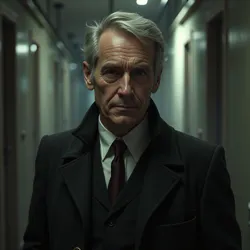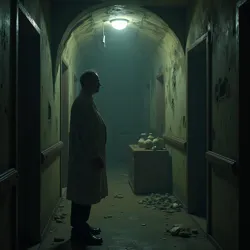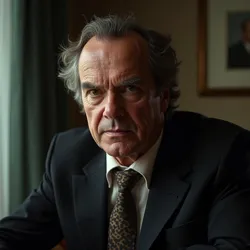Jack Nicholson (Character)

Actor Jack Nicholson portrays Dr Arnold Malkinson in the Backrooms Trilogy, a complex antagonist driven by scientific ambition.
Jack Nicholson
Backrooms Trilogy
leader of M.E.G.
antagonist
obsession with Backrooms
NoCliped (2022)
City in the Rain (2027)
Dr. Arnold Malkinson, portrayed by the acclaimed actor Jack Nicholson, is the central antagonist of the Backrooms Trilogy film series. Introduced as the enigmatic and initially respected leader of the Major Explorer Group (M.E.G.), Malkinson's character arc traces a descent into obsession and ethical compromise as he pursues a deeper understanding and control over the anomalous space known as the Backrooms. Nicholson's portrayal of Malkinson is a critical component of the trilogy's overall success, bringing a chilling intensity and nuanced complexity to a figure who embodies the dangers of unchecked scientific ambition and the corrupting influence of power within the context of the Backrooms' unsettling reality.
Character Conception and Background
Prior to the events of NoCliped (2022), Dr. Arnold Malkinson was already a figure of considerable renown within fringe scientific circles, though details of his early life and academic career remain intentionally obscured within the narrative of the Backrooms Trilogy. It is implied that Malkinson possessed a brilliant but restless intellect, drawn to the fringes of established scientific understanding and captivated by anomalous phenomena. Before the formal establishment of the Major Explorer Group (M.E.G.), Malkinson was reportedly involved in various independent research initiatives, some bordering on the ethically questionable, exploring the nature of liminal spaces and dimensional anomalies.
 Dr Arnold Malkinson's past is shrouded in mystery, with hints of ethically questionable research and involvement in the Edinburgh Incident.
Dr Arnold Malkinson's past is shrouded in mystery, with hints of ethically questionable research and involvement in the Edinburgh Incident.The Edinburgh Incident of 2023, a pivotal event in M.E.G. history only alluded to in Wanderer (2024), is heavily implied to be connected to Malkinson's early experiments and his increasingly radical theories regarding the Backrooms. While the specifics of the incident are redacted in official M.E.G. documentation, fragmented accounts and hushed rumors suggest a catastrophic breach of containment and significant loss of life, events that shaped Malkinson's subsequent approach to Backrooms research and solidified his belief in the necessity of absolute control and, if needed, ruthless methodologies.
Malkinson's motivations are presented as a complex admixture of genuine scientific curiosity, a profound desire for recognition and legacy, and a deeply ingrained need for control. He is not depicted as purely malicious but rather as a man consumed by his pursuit of knowledge, willing to cross ethical boundaries and sacrifice individuals in his quest to unravel the mysteries of the Backrooms and harness its anomalous properties. This nuanced portrayal, brought to life by Nicholson's performance, elevates Malkinson beyond a simple villainous archetype, presenting him as a cautionary figure embodying the potential for scientific hubris and the dangers of unchecked ambition in the face of the unknown.
Role in The Backrooms Trilogy
NoCliped (2022): The Enigmatic Leader
 Driven by a thirst for knowledge and control, Malkinson's obsession with the Backrooms leads him down a dark path of unethical experiments.
Driven by a thirst for knowledge and control, Malkinson's obsession with the Backrooms leads him down a dark path of unethical experiments.In NoCliped (2022), Dr. Arnold Malkinson is introduced as the authoritative and somewhat detached leader of the Major Explorer Group (M.E.G.), presented initially as a beacon of hope and organization within the chaotic and terrifying environment of the Backrooms. When Maria Diaz and Cindy Reynolds encounter Cindy's father, played by David Tennant, he directs them towards the M.E.G. and Malkinson, portraying the organization as a structured entity dedicated to understanding and potentially escaping the Backrooms. Malkinson, in his initial interactions, maintains a calm and professional demeanor, offering a semblance of order and scientific rationality in stark contrast to the irrationality of Level 0.
Nicholson's early portrayal of Malkinson in NoCliped is deliberately understated, hinting at a deeper complexity beneath the surface of scientific authority. His pronouncements regarding the nature of the Backrooms and M.E.G.'s mission are delivered with an almost clinical detachment, and subtle moments of observation – a lingering gaze, a barely perceptible shift in tone – suggest a calculating intelligence and a potential for ruthlessness that is not immediately apparent. While Malkinson provides Maria and Cindy with resources and guidance, the film subtly seeds doubts about his true nature and the M.E.G.'s actual objectives. These early scenes establish Malkinson as a figure of power and influence, but also subtly foreshadow the ethical compromises and darker motives that will be progressively revealed in subsequent installments.
Wanderer (2024): Descent into Obsession
Wanderer (2024) marks a significant turning point in Malkinson's character arc, showcasing his growing obsession with the Backrooms and the increasingly questionable methods he employs in its study. As Maria Diaz and Cindy Reynolds delve deeper into the M.E.G.'s operations within Level 1 and Level 7, they begin to uncover inconsistencies and redacted information, particularly surrounding the Edinburgh Incident (2023). Malkinson's demeanor shifts from detached authority to a more intense and driven focus, his pronouncements becoming more fervent and his control over M.E.G. more absolute.
Nicholson's performance in Wanderer reflects this transformation, injecting a palpable sense of urgency and barely suppressed intensity into Malkinson's interactions. He is shown to be increasingly dismissive of ethical concerns raised by Commander Evelyn Hayes and Dr. Alistair Finch, prioritizing his research objectives above the well-being of M.E.G. operatives and the potential consequences of his experiments. The film introduces the concept of Liquid Pain, a mysterious substance Malkinson is experimenting with, hinting at his increasingly desperate attempts to manipulate the Backrooms and potentially harness its anomalous properties for his own ends. Wanderer culminates in Maria's full realization of Malkinson's true nature and the M.E.G.'s morally compromised operations, setting the stage for the direct confrontation in City in the Rain (2027).
City in the Rain (2027): The Final Confrontation
In City in the Rain (2027), Dr. Arnold Malkinson fully emerges as the trilogy's central antagonist, his obsession having transformed into a dangerous and ruthless pursuit of control over the Backrooms. Operating from his research facility within the Observation Tower in Level 11, Malkinson orchestrates the pursuit of Maria Diaz, viewing her not only as a rogue element but also as a potential key to unlocking further secrets of the anomalous space. His interactions with Maria in City in the Rain are characterized by a chilling blend of scientific detachment and barely veiled contempt for those he deems obstacles to his research.
Nicholson's portrayal of Malkinson in City in the Rain reaches its peak of intensity, conveying a man fully consumed by his ambition and devoid of empathy. His final confrontation with Maria in the Observation Tower is not merely a physical struggle but an ideological clash, with Maria challenging Malkinson's cold, exploitative approach to the Backrooms and advocating for a more humane and respectful understanding of the anomalous. Cindy Reynolds' tragic death at Malkinson's hands serves as the ultimate catalyst for Maria's resolve, solidifying his role as the primary antagonist and driving force behind the film's tragic climax. While Maria ultimately escapes the Backrooms, Malkinson's fate is left ambiguous, with the destruction of the Observation Tower suggesting his potential demise but not explicitly confirming it, leaving a lingering sense of unease regarding his ultimate end and the enduring threat he represents.
Character Analysis
Motivations and Ideology
Dr. Arnold Malkinson's motivations are multifaceted, driven by a complex interplay of scientific curiosity, ambition, and a deep-seated desire for control. At his core, Malkinson is presented as a scientist genuinely fascinated by the Backrooms and its anomalous properties. He seeks to understand its origins, its mechanics, and its potential applications, viewing it as a frontier of scientific discovery unlike any other. However, this scientific curiosity is intertwined with a powerful ambition for recognition and legacy. Malkinson desires to be the one to unravel the Backrooms' mysteries, to be remembered as the pioneering figure who brought order and understanding to this chaotic realm.
This ambition is further fueled by a profound need for control, stemming perhaps from the Edinburgh Incident or a deeper psychological predisposition. Malkinson believes that the Backrooms, with its immense power and unpredictable nature, must be controlled, contained, and ultimately harnessed for the benefit of humanity – or, more accurately, for the benefit of his research and the Major Explorer Group. This ideology justifies his increasingly unethical methods, as he comes to believe that the ends justify the means in the pursuit of Backrooms knowledge and control. He views individuals, including Maria and Cindy, as expendable resources in this grand scientific endeavor, dismissing ethical concerns as sentimental obstacles to progress. Malkinson's ideology is a chilling reflection of the potential for scientific rationalization to be twisted into justification for morally reprehensible actions, particularly when dealing with the unknown and the anomalous.
Relationship with Maria Diaz
The adversarial relationship between Dr. Arnold Malkinson and Maria Diaz forms a central thematic and narrative axis of the Backrooms Trilogy. Initially, Malkinson represents a figure of authority and guidance for Maria, offering her a semblance of safety and purpose within the terrifying environment of the Backrooms. However, as Maria's understanding of the M.E.G. and the Backrooms deepens, she increasingly comes to question Malkinson's methods and his true intentions. This growing skepticism evolves into outright opposition as Maria uncovers the unethical experiments and morally compromised practices orchestrated by Malkinson and the M.E.G.
Maria and Malkinson represent diametrically opposed approaches to the Backrooms. Malkinson views the Backrooms as a problem to be solved, a phenomenon to be controlled and exploited for scientific gain. He approaches it with cold, detached rationality, prioritizing data and control above all else. Maria, in contrast, develops a more empathetic and intuitive understanding of the Backrooms, recognizing its inherent dangers but also sensing a deeper, perhaps unknowable, nature that demands respect rather than domination. She prioritizes human connection and survival, even within the dehumanizing environment of the Backrooms, forming bonds with Cindy and other survivors and challenging Malkinson's detached, utilitarian worldview.
Their final confrontation in the Observation Tower is a symbolic showdown between these two opposing ideologies. Maria accuses Malkinson of lacking empathy and of treating the Backrooms and its inhabitants as mere objects of study, while Malkinson dismisses Maria's concerns as naive sentimentality. This conflict underscores the trilogy's broader thematic exploration of the ethical dilemmas inherent in scientific exploration and the importance of maintaining human compassion even in the face of the incomprehensible and the terrifying.
Symbolism
Dr. Arnold Malkinson's character serves as a potent symbol within the Backrooms Trilogy, embodying several interconnected thematic concerns. He represents the corrupting influence of unchecked power, particularly within institutional structures like the Major Explorer Group. His descent from respected scientist to ruthless antagonist illustrates how ambition and a desire for control can warp even initially noble intentions, leading to ethical compromises and ultimately, villainy. Malkinson's trajectory serves as a cautionary tale about the dangers of placing unchecked authority in the hands of individuals driven by personal ambition rather than ethical principles.
Furthermore, Malkinson symbolizes the potential for scientific hubris and the dangers of approaching the unknown with a purely rational and exploitative mindset. His attempts to control and manipulate the Backrooms, driven by his belief in scientific mastery over nature, ultimately lead to disastrous consequences, both for himself and for those around him. His character underscores the trilogy's critique of a purely mechanistic worldview and its advocacy for a more nuanced and respectful approach to the anomalous and the unknown, acknowledging the limits of human understanding and the potential for unintended consequences when attempting to dominate forces beyond our comprehension. In this sense, Malkinson’s fate, and the ambiguous ending of City in the Rain, can be interpreted as a subtle warning against the overreach of scientific ambition and the necessity of humility in the face of truly profound mysteries.
Nicholson's Performance
Critical Reception
 Critics praised Jack Nicholson's portrayal of Malkinson for its chilling intensity and nuanced complexity, highlighting his subtle yet powerful acting.
Critics praised Jack Nicholson's portrayal of Malkinson for its chilling intensity and nuanced complexity, highlighting his subtle yet powerful acting.Jack Nicholson's portrayal of Dr. Arnold Malkinson was universally acclaimed by critics, widely recognized as a standout element of the Backrooms Trilogy and a key factor in its overall success. Critics lauded Nicholson's ability to imbue Malkinson with a chilling intensity and nuanced complexity, avoiding simplistic villainy and instead crafting a character who is both terrifying and disturbingly believable. His performance was praised for its subtle shifts in demeanor across the trilogy, effectively conveying Malkinson's gradual descent into obsession and ruthlessness.
Reviewers consistently highlighted Nicholson's masterful use of subtle gestures, vocal inflections, and facial expressions to create a sense of unease and underlying menace even in Malkinson's ostensibly calm and rational moments. His delivery of dialogue, often laced with scientific jargon and detached pronouncements, was described as both captivating and unsettling, perfectly capturing the character's blend of intellectual brilliance and emotional coldness. Nicholson's performance was frequently cited as a masterclass in psychological horror acting, elevating Malkinson beyond a mere plot device and transforming him into a truly memorable and impactful antagonist.
Impact on the Character
Nicholson's established screen persona, often associated with charismatic intensity and a hint of unpredictable volatility, significantly shaped the audience's perception of Dr. Arnold Malkinson. His casting brought an immediate sense of gravitas and established villainous precedent to the role, lending weight to the character's authority and foreshadowing his potential for darkness from his very first appearance in NoCliped (2022). Nicholson's distinctive acting style, characterized by his expressive physicality and his ability to convey complex emotions with subtle nuances, allowed him to bring a depth and psychological realism to Malkinson that might not have been achieved by a less experienced or less distinctive performer.
His performance choices, such as the deliberate stillness of his posture, the intensity of his gaze, and the measured cadence of his voice, all contributed to creating a character who is both intellectually formidable and deeply unsettling. Nicholson's portrayal of Malkinson effectively leveraged his established screen presence to amplify the character's thematic significance, transforming him into a potent symbol of unchecked ambition and the potential for darkness lurking beneath the veneer of scientific rationality. His performance is not merely an acting showcase but an integral component of the trilogy's overall narrative and thematic impact.
Legacy and Influence
Malkinson's Impact on the Backrooms Lore
Dr. Arnold Malkinson's actions and ideology have a profound and lasting impact on the fictional universe established within the Backrooms Trilogy. His experiments with Liquid Pain and his relentless pursuit of Backrooms control are directly implicated in the escalating dangers and instability observed across different Backrooms levels throughout the trilogy. The Edinburgh Incident, heavily hinted to be a consequence of Malkinson's early research, casts a long shadow over the M.E.G. and informs its increasingly militaristic and ethically compromised operational protocols.
Malkinson's legacy extends beyond the immediate events of the trilogy, influencing fan theories and interpretations of the broader Backrooms mythos. His pursuit of control and his belief in the Backrooms as a resource to be exploited resonate with broader anxieties about scientific overreach and the potential for human intervention to disrupt delicate or incomprehensible systems. The ambiguous fate of Malkinson at the conclusion of City in the Rain further contributes to his enduring impact, leaving open the possibility that his influence may continue to shape the Backrooms universe in future narratives or spin-offs, such as the announced Echoes of Edinburgh series. His character serves as a recurring point of reference for discussions about the ethical boundaries of Backrooms exploration and the potential consequences of prioritizing scientific ambition above all else.
Cultural Resonance
Dr. Arnold Malkinson's character, as brought to life by Jack Nicholson, resonates with contemporary cultural anxieties surrounding science, technology, and institutional power. In an era marked by rapid technological advancements and growing skepticism towards established institutions, Malkinson embodies the potential for scientific expertise to be twisted for personal gain or misused in the pursuit of unchecked ambition. His morally ambiguous actions and his detached, utilitarian worldview reflect broader concerns about the ethical implications of scientific progress and the need for greater accountability and transparency within scientific and technological organizations.
Malkinson's character also taps into anxieties about surveillance, control, and the erosion of individual autonomy in the face of powerful institutions. The M.E.G., under Malkinson's leadership, embodies a form of institutional paranoia, prioritizing secrecy and control over ethical considerations and individual well-being. This portrayal resonates with contemporary anxieties about government overreach, corporate power, and the potential for technology to be used for surveillance and manipulation. Malkinson, therefore, is not merely a villain within a horror film but a culturally relevant figure who embodies a range of contemporary societal anxieties, contributing to the Backrooms Trilogy's broader cultural impact and its capacity to spark meaningful discussions about science, ethics, and the human condition in the face of the unknown.
Behind the Scenes: Malkinson's Portrayal
Casting and Development
The casting of Jack Nicholson as Dr. Arnold Malkinson was considered a significant coup for the Backrooms Trilogy production, adding considerable prestige and star power to the franchise. Director Alistair Humphrey and screenwriters Jasper Thorne and Beatrice Bellweather reportedly conceived the character of Malkinson with Nicholson specifically in mind, believing his established screen persona and acting range would be ideally suited to portray the complex and morally ambiguous antagonist. Early drafts of the script reportedly emphasized Malkinson's intellectual brilliance and underlying intensity, traits that aligned perfectly with Nicholson's known strengths as an actor.
The development of Malkinson's character involved close collaboration between Nicholson, Humphrey, Thorne, and Bellweather. Nicholson was reportedly deeply engaged in shaping Malkinson's backstory and motivations, contributing ideas about his early career, his relationship with the M.E.G., and his evolving ideology regarding the Backrooms. He emphasized the importance of portraying Malkinson not as a purely evil figure but as a man driven by understandable, if ultimately misguided, desires for knowledge and control. This collaborative process ensured that Malkinson's character was not only compelling on the page but also tailored to Nicholson's specific acting style and screen presence, maximizing the impact of his portrayal.
Nicholson's Approach to the Role
Jack Nicholson's approach to portraying Dr. Arnold Malkinson was characterized by meticulous preparation and a deep engagement with the character's psychological complexities. He reportedly conducted extensive research into fringe science and anomalous phenomena, seeking to understand the intellectual underpinnings of Malkinson's obsession with the Backrooms. Nicholson also worked closely with director Alistair Humphrey to develop Malkinson's visual presentation, opting for a subtly understated and professional appearance that contrasted with the increasingly chaotic and unsettling environments of the Backrooms.
His acting method for Malkinson emphasized subtle nuances and internal intensity rather than overt displays of villainy. Nicholson focused on conveying Malkinson's calculating intelligence, his detached demeanor, and his barely suppressed ambition through subtle gestures, vocal inflections, and facial expressions. He reportedly spent considerable time in rehearsals exploring Malkinson's emotional arc across the trilogy, mapping out the gradual shift from respected leader to morally compromised antagonist. This meticulous and nuanced approach, characteristic of Nicholson's acting style, contributed significantly to the effectiveness and memorability of his portrayal of Dr. Arnold Malkinson.
Director and Writer Collaboration
The collaborative dynamic between Jack Nicholson, director Alistair Humphrey, and screenwriters Jasper Thorne and Beatrice Bellweather was crucial in shaping the character of Dr. Arnold Malkinson and ensuring his seamless integration into the narrative of the Backrooms Trilogy. Humphrey's directorial vision emphasized atmosphere, psychological suspense, and character-driven horror, providing a framework that allowed Nicholson's nuanced performance to take center stage. Thorne and Bellweather's screenplay provided a solid foundation for Malkinson's arc, but also allowed for flexibility and improvisation during filming, enabling Nicholson to further refine and develop the character in collaboration with the director.
Humphrey reportedly encouraged Nicholson to explore the subtle nuances of Malkinson's personality and to bring his own interpretations to the role, fostering a creative environment that valued actor input and character depth. Thorne and Bellweather, while adhering to the overall narrative structure of the trilogy, were also receptive to Nicholson's insights, adapting dialogue and scenes to better suit his performance and further enhance Malkinson's thematic resonance. This collaborative process, characterized by mutual respect and a shared commitment to character development, resulted in a portrayal of Dr. Arnold Malkinson that is both compellingly performed and seamlessly woven into the fabric of the Backrooms Trilogy's narrative and thematic concerns.
Conclusion
Dr. Arnold Malkinson, as portrayed by Jack Nicholson, stands as a central and unforgettable figure within the Backrooms Trilogy. His character arc, tracing a descent from respected scientist to morally compromised antagonist, serves as a potent exploration of scientific hubris, institutional corruption, and the dangers of unchecked ambition. Nicholson's nuanced and chilling performance brought a depth and complexity to Malkinson that resonated with critics and audiences alike, solidifying his status as a memorable and culturally relevant villain within contemporary horror cinema. Malkinson's legacy extends beyond the trilogy's narrative, influencing fan interpretations of the Backrooms mythos and serving as a cautionary symbol of the ethical dilemmas inherent in exploring the unknown. His character, and Nicholson's masterful portrayal, remain a key element in the enduring appeal and cultural impact of the Backrooms Trilogy.
{{stub}}
Category:Characters in The Backrooms Trilogy Category:Antagonists Category:Major Explorer Group (M.E.G.)